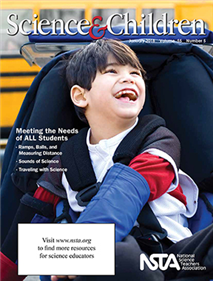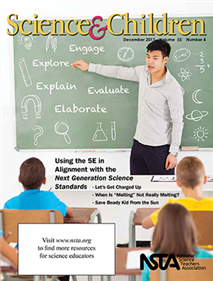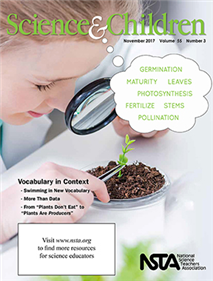All Inquiry resources
Journal Article
The Early Years: An Activity for Every Child
This column discusses resources and science topics related to students in grades preK to 2. This month’s issue has students developing a seed-planting activity that allows all children to actively participate and document their understanding of see...
Journal Article
Science 102: A Bunny of a Different Color
This column shares exercises to challenge content knowledge. This month's issue presents a new challenge and answers the Ghostly Images challenge from last month....
Journal Article
Editor's Note: Developing Coherent Lessons With the NGSS and 5E
Science and Children’s editor shares thoughts regarding the current issue....
Journal Article
The Early Years: Using the 5Es to Teach Seasonal Changes
Learn how to use a thermometer to investigate and document seasonal changes in the local environment....
Journal Article
This column shares exercises to challenge content knowledge. This month's issue presents a new challenge and answers the The Face That Follows You challenge from last month....
NSTA Press Book
Harnessing Solar Energy, Grade 4: STEM Road Map for Elementary School
What if you could challenge your fourth graders to use solar energy to provide the world with clean water? With this volume in the STEM Road Map Curriculum Series, you can! Harnessing Solar Energy outlines a journey that will steer your students...
NSTA Press Book
Construction Materials, Grade 11: STEM Road Map for High School
What if you could challenge your 11th graders to gain an understanding of the feats of engineering required to build high-rise buildings—and maybe even improve them? With this volume in the STEM Road Map Curriculum Series, you can!...
Journal Article
This column shares exercises to challenge content knowledge. This month's issue presents a new challenge and answers the Bouncing Ball challenge from last month....





